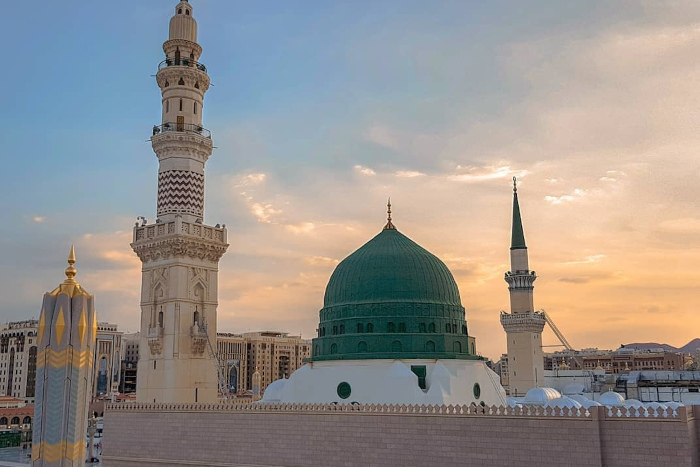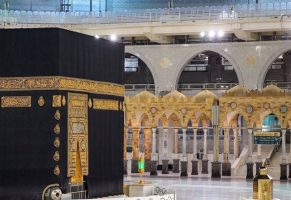 During the era of jaahiliyyah (the pre-Islamic era), there was a lengthy period that passed in which many battles were fought between the various clans of the Arabs viz. the Quraish, Banu Kinaanah, Qays, Hawaazin, etc. One of the well-known battles that transpired after the incident of the elephants was the battle known as “Harb-ul-Fijaar” which was fought between the Quraish and Qays clans.
During the era of jaahiliyyah (the pre-Islamic era), there was a lengthy period that passed in which many battles were fought between the various clans of the Arabs viz. the Quraish, Banu Kinaanah, Qays, Hawaazin, etc. One of the well-known battles that transpired after the incident of the elephants was the battle known as “Harb-ul-Fijaar” which was fought between the Quraish and Qays clans.
Some Ulama have mentioned that at the time of Harb-ul-Fijaar, Rasulullah (sallallahu ‘alaihi wasallam) was fourteen or fifteen years old, while other Ulama have mentioned that Rasulullah (sallallahu ‘alaihi wasallam) was twenty years old at the time of this battle. (Rowdhul Unf 1/318/321)
During this battle, Rasulullah (sallallahu ‘alaihi wasallam) did not personally participate in the fighting. However, he would hand arrows to his uncles to fire at the enemy. (Al-Bidaayah wan-Nihaayah 2/269)
In this battle, the clan of Qays initially gained the upper hand against the Quraish, but ultimately, the Quraish prevailed. Subsequently, both clans agreed to enter into a truce in order to stop further bloodshed.
Nevertheless, since the tension between the clans still remained, some people feared that hostility could flare up once again and bloodshed could resume, and therefore, a pact of peace needed to be drawn up in order to defend the innocent and protect the oppressed.
They felt that that just as bloodshed and killing was previously brought to an end by a pact devised by the three Fadhls – Fadhl bin Fadhaalah, Fadhl bin Wadaa’ah and Fadhl bin Haarith, whose names caused this pact to be popularly known as Hilf-ul-Fudhool (the Pact of the Three Fadhls), in the same way, there was today an urgent need to once again revive this pact.
Zubair bin Abdul Muttalib mentioned this pact in his poetry saying:
إن الفضول تحالفوا وتعاقدوا ألا يقيم ببطن مكة ظالم
Indeed the three Fadhls (Fadhl bin Fudhaalah, Fadhl bin Wadaa‘ah and Fadhl bin Haarith) all took a solemn pledge from the people that no oppressor would be permitted to live within the valley of Makkah.
أمر عليه تعاهدوا وتواثقوا فالجار والمعتر فيهم سالم
They all pledged and agreed to this, and hence the neighbors and visitors would all be safe among them in Makkah.
The first person to revive this pact after Harbul Fijaar was Zubair bin Abdul Muttalib. The Banu Haashim and Banu Taym gathered in the home of Abdullah bin Jud’aan who had prepared food for all present. At that time, everybody present pledged to assist the oppressed, regardless of whether the oppressed was related or unrelated in kinship, a local or foreigner.
In regard to this noble and praiseworthy pact, Rasulullah (sallallahu ‘alaihi wasallam) mentioned, “On the occasion of this pledge, I was also present at the home of Abdullah bin Jud’aan. Even if I was offered red camels in exchange of breaking this pledge, I would not accept it. Now, even in the era of Islam, if I was called to join in a pledge of this nature, I would definitely agree to join (as it is a noble and praiseworthy cause to assist the oppressed).”
(Rowdhul Unf 1/242-246, Al-Bidaayah wan-Nihaayah 2/268-272, Tabaqaat Ibnu Sa’d 1/103, Seeratul Mustafa 1/93-95)
Note:
Abdullah bin Jud’aan was the person in whose home Hilf-ul-Fudhool took place. He was the cousin of Hazrat Aishah (radhiyallahu ‘anha) i.e. her father’s brother’s son. He was known to be an extremely generous person, and even on the occasion of Hilf-ul-Fudhool, he fed the people in his home. However, he did not embrace Islam and passed away on kufr.
Once, Hazrat Aishah (radhiyallahu ‘anha) asked Rasulullah (sallallahu ‘alaihi wasallam), “O Rasul of Allah (sallallahu ‘alaihi wasallam)! Abdullah bin Jud’aan was extremely hospitable to his guests and would feed the people often. Will this benefit him in any way on the Day of Qiyaamah?” Rasulullah (sallallahu ‘alaihi wasallam) replied, “No! This is because he did not say:
رب اغفر لي خطيئتي يوم الدين
O my Rabb! Forgive my sins on the Day of Reckoning!
In other words, he did not seek forgiveness for his sins at any time in his life (i.e. he did not bring Imaan and accept the deen of Muhammed [sallallahu ‘alaihi wasallam]). (Saheeh Muslim #214)
Source: The Illustrious Sahaabah
 Ihyaaud Deen An Effort to Revive Deen in Totality
Ihyaaud Deen An Effort to Revive Deen in Totality



